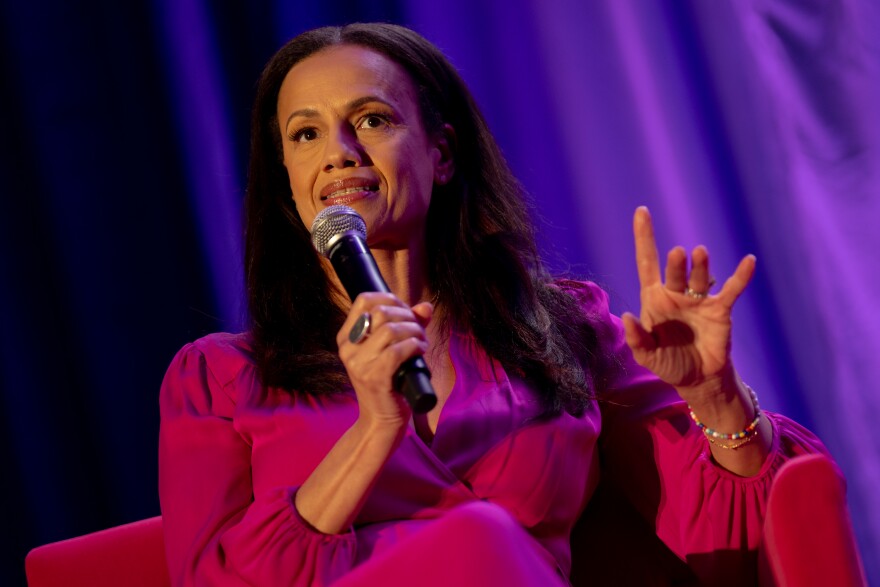Missouri provided a spark to the abortion rights movement that’s warily monitoring a GOP-controlled federal government, Planned Parenthood President and CEO Alexis McGill Johnson said Wednesday at an event in Clayton.
McGill Johnson spoke at a fundraiser for Planned Parenthood Great Rivers. After the event, she told St. Louis Public Radio that Missourians legalizing abortion and placing protections for the procedure in the state constitution — while also voting for President Donald Trump by more than 18 percentage points — spoke volumes.
“I think it's incredibly exciting that Missouri had that win in November, and the fact that Missourians are actually able to get access to abortion a few months later,” McGill Johnson said. “And it says that no matter what state you are in, the majority of people support access to abortion. They believe the decision should be left to patients and their providers, and there's no room in that exam room for politicians.”
Amendment 3 received more than 338,000 votes more than Democratic presidential nominee Kamala Harris and won outright in GOP-dominated places like St. Charles and Buchanan counties.
McGill Johnson said that type of result shows that abortion rights can not only transcend party lines, but also generational and gender lines. Pew Research Center data from May 2024 showed that 61% of men supported keeping abortion legal in all or most cases.
“I think oftentimes this issue has been framed as a polarizing issue, and I think that's a bit of a false equivalence,” McGill Johnson said. “The majority of Americans support reproductive freedom, and that's why you've seen wins as varied as in New York and California and Missouri and Montana.”

Access returns to Missouri but not without pushback
Since Amendment 3 went into effect in December, Jackson County Judge Jerri Zhang knocked down a number of abortion restrictions — including the near-total ban after Roe v. Wade was overturned in 2022.
Clinics in St. Louis, Columbia and Kansas City resumed abortion access after Zhang struck down licensing requirements for clinics in February. But the state health department rejected what’s known as a complication plan that’s required for those clinics to provide medication abortions, meaning that they’re currently offering procedural abortions for now.
And Attorney General Andrew Bailey’s office is contesting efforts to strike down the state’s abortion laws in court, which means the legal battle over abortion access will likely not be over anytime soon.
Planned Parenthood Great Rivers President and CEO Margot Riphagen said pushback from the GOP-controlled state government shows that abortion rights proponents need to be vigilant.
“We need to all stay in this fight and to be working together in order to implement Amendment 3,” Riphagen said.
McGill Johnson said abortion rights groups are also staying vigilant over the Trump administration, particularly about how the Department of Health and Human Services may try to target medication abortion through restrictions on drugs like mifepristone.
“This president told us who he was a long time ago with respect to advancing an anti-abortion agenda, and we should expect it,” McGill Johnson said. “And we also know that they are afraid, because they know that Planned Parenthood and abortion are both more popular than this administration. And so a full frontal attack is also going to be very challenging for them.”

Defending Amendment 3
Both McGill Johnson and Riphagen said they are prepared to defend abortion rights at the ballot box in Missouri.
The GOP-controlled General Assembly wants to put a ballot measure repealing and replacing Amendment 3 before voters — most likely in 2026. While it’s unclear what will be in the final proposal, the House recently approved a plan that would allow the legislature to ban most abortions except for some instances of rape, incest, fatal fetal abnormalities and life of the mother.
“Missourians have always supported a culture of life,” said the bill’s handler, Rep. Brian Seitz, R-Branson, said last week. “They also desire to influence their government through their elected representatives and participate via their personal vote.”
Riphagen said: “Folks have been in this fight for a long time, and believe and know that they deserve access to health care, which includes abortion access in their own state. Folks can continue to rely on us for that care, and we'll still be here in this fight, and we won't give up no matter what.”
McGill Johnson added that the battle for abortion rights didn’t just start with the fall of Roe v. Wade in 2022, adding “every time they try to come for Planned Parenthood, they try to come for abortion access, we also demonstrate increasing support for our ability to access reproductive freedom.”
“And I think that's actually the lesson that we should be taking away, not that they're going to continue to come for our rights, but the fact that the people are growing and understand in a much more expansive way the importance of abortion as part of a reproductive health care spectrum of care that Planned Parenthood provides, that our independent providers provide,” she said. “And that helps us understand why it is an essential part of self determination for our communities.”






